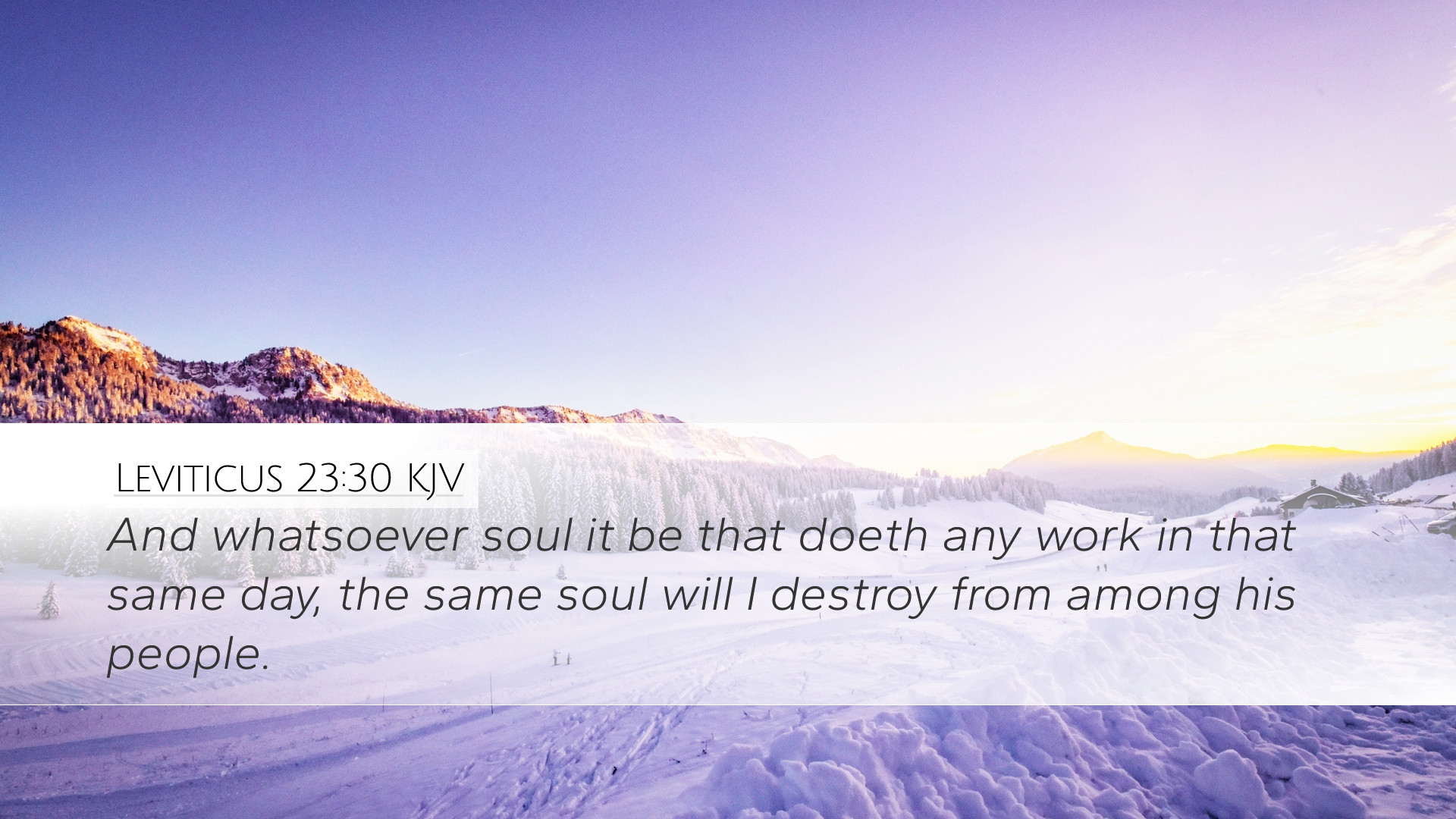Commentary on Leviticus 23:30
Verse: "And whosoever it be that doeth any work in that same day, the same soul will I destroy from among his people."
Introduction
This verse from Leviticus articulates God's command regarding the observance of the Day of Atonement (Yom Kippur), emphasizing the seriousness of this sacred day in the life of Israel. Public domain commentaries provide rich insights into the purpose of this command and its implications for the faithful.
Historical Context
The Day of Atonement was instituted as a day of fasting and solemn assembly, distinct from other festivals in Israel. It was a day set apart for the atonement of the nation’s sins. The gravity of the prohibition against work highlights the sacredness of the day.
Matthew Henry's Commentary
Matthew Henry emphasizes the seriousness with which God regards the observance of His commandments, particularly concerning the Day of Atonement. He notes that this day was not merely a festival but a day of deep spiritual significance meant for repentance and humility before God. To violate this day through work was to treat lightly what God had deemed holy.
- Divine Punishment: Henry points out that the phrase “the same soul will I destroy” indicates the severe consequences of transgression. This reflects God’s holiness and the need for His people to be distinct from other nations.
- Spiritual Reflection: He also highlights that the command not to work should prompt believers to reflect on their spiritual state, emphasizing a time dedicated to prayer and introspection.
Albert Barnes' Notes
Albert Barnes offers a detailed analysis of the verse, focusing on the implications of "work." He interprets it within the context of the covenant relationship between God and Israel.
- Work Defined: According to Barnes, "work" includes any form of labor that detracts from the solemn observance of the day. This emphasizes the need for complete dedication to the Lord’s service during this time.
- Collective Responsibility: Barnes also discusses the communal aspect of the Day of Atonement, suggesting that the spiritual health of the individual affects the nation as a whole. Transgression not only impacted the individual but could compromise the entire community's relationship with God.
- Grace and Judgment: He posits that while God's judgment is imminent for sin, His grace is always available for repentance, illustrating the dual nature of God's holiness and mercy.
Adam Clarke's Commentary
Adam Clarke presents a theological exploration of the verse, identifying its place within the broader framework of sacrificial system and atonement.
- Covenantal Significance: Clarke emphasizes that the Day of Atonement was to remind Israel of their continual need for atonement and reconciliation with God through the sacrificial system established in the Mosaic law.
- Consequences of Disobedience: He elaborates on the weight of the consequences described in the text, viewing them as an invitation to holiness and diligence in observing God's commands.
Theological Implications
Leviticus 23:30 raises significant theological questions about sin, righteousness, and the nature of God’s judgment. The command reinforces the idea that God desires His people to be wholly devoted, particularly during sacred observances.
The Nature of Sin
The verse illustrates the severity with which God views sin, especially in a context meant for worship and repentance. It signals that neglecting worship does not merely inconvenience God; it signifies a relational breach within the covenant community.
Importance of Sacred Time
By instituting a day free from work, God invites His people into a rhythm of life that prioritizes spiritual engagement over earthly labor. This divinely ordained interruption serves a dual purpose of acknowledging human limitations and fostering a deeper connection with God.
Practical Application for Today
For modern believers, Leviticus 23:30 invites us to contemplate our own observance of sacred time and to consider how we prioritize spiritual practices in a busy world.
- Time for God: Just as ancient Israel was called to refrain from work, contemporary Christians are challenged to carve out time for worship, reflection, and community. This could mean setting aside specific days for rest and spiritual engagement.
- Collective Worship: The communal aspects of worship, as highlighted in the commentaries, call on believers to gather as a body. This reflects the importance of maintaining corporate spiritual health.
- Awareness of Sin: The serious approach towards sin and the call to atonement underscore our ongoing need for repentance and grace. This serves as a reminder to engage in self-reflection and community accountability.
Conclusion
Leviticus 23:30 serves as a solemn reminder of God's holiness and the seriousness with which He views the observance of sacred times. The insights from historical commentaries deepen our understanding of the text, challenging us to live lives marked by reverence and commitment to God’s purposes. As we reflect on this scripture, may we embrace the call to holiness and seek a deeper relationship with our Creator.


